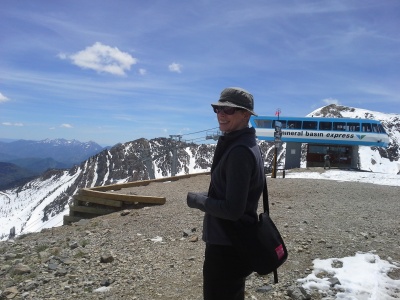- You are here:
- Home
April 28, 2016
| Atlanta, GA
What is your research about?
I work at the interface of discrete mathematics and molecular biology. For instance, most viruses code their genomes in RNA rather than DNA, which is then packaged into a protein capsid. Understanding how this happens is a fundamental biomedical problem with important therapeutic applications. The "branching" of these large RNA molecules (much like a tree in nature) is a critical characteristic that I've studied using techniques from analytic, geometric, and probabilistic combinatorics.
What has been the most exciting time so far in your research life?
The most recent breakthrough always seems the most exciting. As one of my undergraduate researchers, who is now a PhD student in the School of Electrical and Computer Engineering and works at the Georgia Tech Research Institute, said: "It's hard but rewarding. Half the time it feels like you are banging your head against the wall, but every now and then you get something to work, and it's such a rush."
How did you find your way to mathematics research?
My father is also a mathematician, so by becoming an academic I was just going into the family business. However, I majored in both biology and physics before settling on mathematics as the common denominator among all my interests.
What advice would you give to a college freshman who wants to be a mathematician?
A degree in mathematics can be the gateway to any number of great career options - basically anything that values problem-solving and analytical skills including medicine, law, and business, as well as statistics, actuarial science, and computing. And of course, teaching, industrial research, or academia.
If you could not be a mathematician, in what line of work would you be now?
Recently, I've become interested in architecture, urban planning, and the physical environment's effect on our psyches. It's fascinating to be in downtown Atlanta and realize that it's more obvious how to enter a building from a vehicle than on foot.
What is the most exciting thing about being a part of Georgia Tech?
The School of Math is on an amazing trajectory; the list of top math departments has been relatively static for decades, but we're one of the few newcomers. That's a testament to the value of investing in mathematics at one of the premier engineering schools in the world.
What are you most surprised about in your encounters with Georgia Tech students?
The students here are very smart and highly motivated, yet retain a sense of humor about the campus culture that resonates with my own geekiness.
How many official bookstores sell the equivalent of our "North Avenue Trade School" T-shirts? I gave my father one a couple of years ago, and he's worn it so much that I had to buy a replacement.
What unusual skill, talent, or quality do you have that is not obvious to your colleagues?
As an undergraduate in Urbana, I took the opportunity to study Japanese tea ceremony. Setting aside time each week to focus on the ritual of preparing and serving a bowl of matcha tea was a wonderful way to clear my mind.
What is your ideal way of relaxing?
Since I have two young children, I'm quite fuzzy on the concept of "leisure." However, it's great fun to do simple things with them, like going for a walk to see the outdoor sculptures around Midtown.
What three destinations are still in your travel to-do list?
My husband is from Australia, and we travel there to visit his family, but I have yet to see notable places like the Great Barrier Reef or Uluru/Ayers Rock. Conversely, he's seen relatively little of the United States, and there are so many natural wonders closer to home. This just means that we're really looking forward to exploring the world with our daughters as they grow up.
If you won $10 Million in a lottery, what would you do with it?
What I really need is more hours in the day, but that's not something you can buy.

